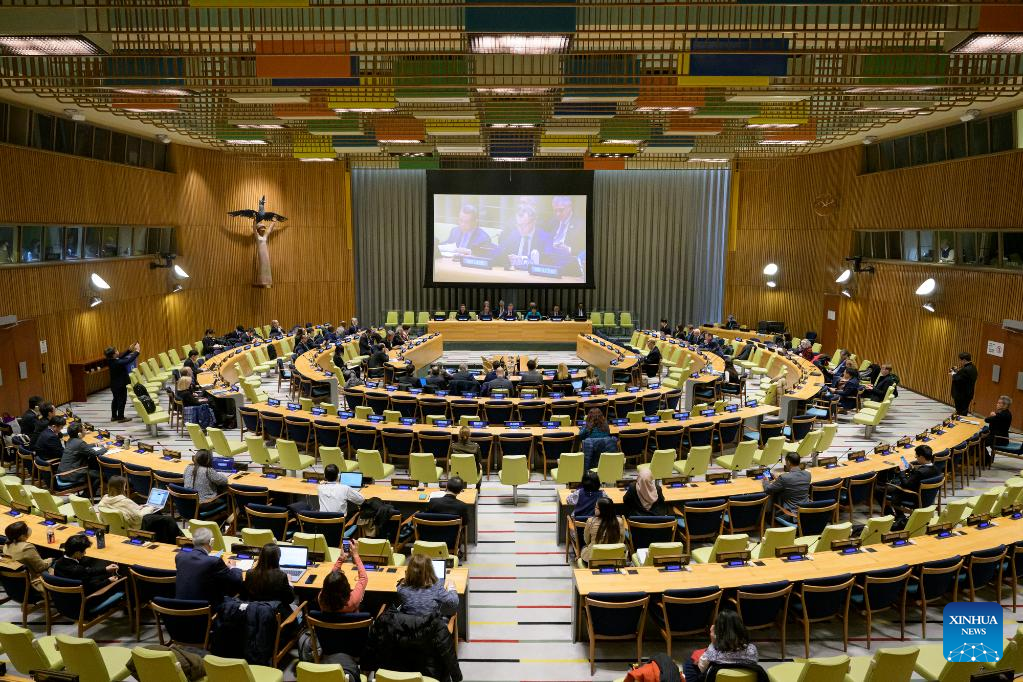
This photo taken on March 21, 2023 shows the sixth UN Special Thematic Session on Water and Disasters at the UN headquarters in New York. (Manuel Elías/UN Photo/Handout via Xinhua)
UNITED NATIONS, March 22 (Xinhua) -- Providing access to water for all countries hinges largely on improving cooperation, a United Nations (UN) report said Tuesday.
The United Nations Educational, Scientific, and Cultural Organization (UNESCO) published the World Water Development Report focusing on partnerships and cooperation ahead of the UN 2023 Water Conference, which is to be held Wednesday and Thursday.
The report examines ways that actors can collaborate to overcome common challenges. It said that 3.6 billion people around the world lack access to safe sanitation and 2 billion do not have access to safe drinking water.
The global urban population facing water scarcity is projected to potentially double from 930 million in 2016 to between 1.7 billion and 2.4 billion in 2050.
Increasing extreme and prolonged droughts are also stressing ecosystems, resulting in dire consequences for both plants and animals.
Detailing both good and bad experiences of partners' efforts to collaborate, the report explains how accelerating progress on achieving related 2030 Agenda goals hinges on enhancing positive, meaningful cooperation in water supply and sanitation.
"As we arrive at the critical midpoint of our 2030 Agenda, we need more solidarity, more cooperation, more game-changing initiatives and more science-based actionable solutions to fulfil the promise," Csaba Korosi, president of the 77th session of the UN General Assembly said Tuesday at the sixth UN Special Thematic Session on Water and Disasters.
"There is an urgent need to establish strong international mechanisms to prevent the global water crisis from spiraling out of control," said UNESCO Director-General Audrey Azoulay.
"Water is our common future, and it is essential to act together to share it equitably and manage it sustainably," said Azoulay.
At a press conference at the UN headquarters, Richard Connor, editor-in-chief of the UN report, said that "uncertainties are increasing."
"If we don't address it, there definitely will be a global crisis," he said, referring to rising scarcity that reflects reduced availability and increasing demands, from urban and industrial growth to agriculture, which alone consumes 70 percent of the world's supply.
It is imperative to build partnerships and cooperate in order to achieve human rights to water supply and to overcome existing challenges, he said.
Explaining the landscape of such shortages, he said economic water scarcity is a big problem where governments fail to provide safe access, such as in the middle of Africa. Meanwhile, physical scarcity is worst in desert areas, including northern India and the Middle East.
Strengthening transboundary cooperation is the main tool to avoid conflicts and escalating tensions, he said, noting that 153 countries share nearly 900 rivers, lakes and aquifer systems, with more than half having signed agreements.
From city dwellers to small holder farmers, partnerships have produced mutually beneficial results. By investing in agricultural communities upstream, farmers can benefit in ways that help the downstream cities they feed, he said.
States and stakeholders can cooperate in such areas as flood and pollution control, data sharing, and co-financing. From wastewater treatment systems to protecting wetlands, efforts contributing to reducing greenhouse gas emissions should "open the door to further collaboration and increase access to water funds," he said.
Johannes Cullmann, scientific advisor to the president of the UN General Assembly, said that "it's a question of investing wisely."
While water resources and how they are managed impact almost all aspects of sustainable development, including the 17 Sustainable Development Goals (SDGs), he said current investments must be quadrupled to meet the annually estimated 600 billion to 1 trillion U.S. dollars required to realize the SDGs on water and sanitation.
"Cooperation is the heart of sustainable development, and water is an immensely powerful connector," he said. "We should not negotiate water. We should deliberate on it," he said.
Indeed, water should be "managed as a common good, not a commodity," a group of 18 UN independent experts and special rapporteurs said in a joint statement on Tuesday.
"It is time to stop a technocratic approach to water and consider the ideas, knowledge and solutions of indigenous peoples and local communities who understand the local aquatic ecosystems to ensure sustainability of the water agenda," they said. ■



